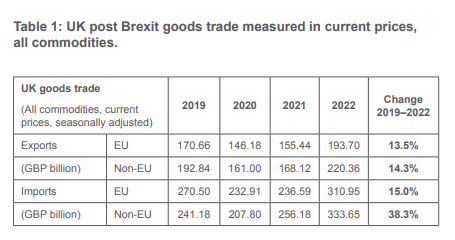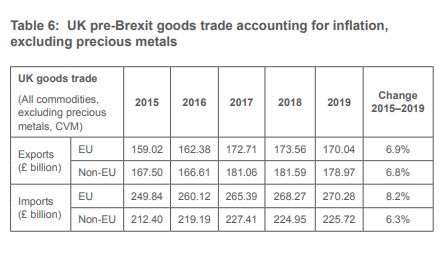- Trade continued to grow between 2016 and the conclusion of
the Brexit transition in 2020, indicating that Brexit uncertainty
did not reduce investment.
- UK goods exports rose by 13.5 per cent to EU countries and
14.3 per cent to non-EU countries between 2019 and 2022, before
and after Brexit. This indicates no impact of Brexit on goods
trade.
- UK services exports rose by 14.8 per cent to EU countries and
22.1 per cent to non-EU countries over the same period. Varying
demand levels for different products across countries, rather
than any consistent Brexit impact, explains this finding.
- UK trade patterns compared to other G7 countries have not
changed since Brexit.
- Business and Trade Secretary The Rt Hon Kemi
Badenoch MP will today (Monday, 6 November) say
“As today’s excellent IEA paper, written by the economist
Catherine McBride, shows - contrary to some media reports and
many pre-Brexit establishment voices, the data says Brexit has
not had a major impact on UK–EU trade. UK trade with EU countries
has broadly moved in line with UK trade with non-EU
countries,” at the launch of International Trade Week.
Brexit has not damaged Britain’s trade with the European Union
(EU), according to a new report from the free market think tank
the Institute of Economic Affairs.
The Office for Budget Responsibility (OBR) asserted that Brexit
barriers would result in a 15 per cent drop in trade volumes,
contributing to a 4 per cent lower GDP in the long run. This was
based on modelling before Britain left the bloc. But now,
according to the IEA report, real-world trade data is painting an
entirely different picture.
“While the data is still emerging and longer-term effects are
as-yet unknowable, in general, there has been no real disparity
between UK trade with EU and non-EU countries,” report author and
trade economist Catherine McBride writes.
“Nor has there been a sharp fall in UK–EU trade either at the
aggregate or sector level despite it now being seven years since
the vote to leave the EU and three years since the UK actually
left.”
McBride highlights how factors such as the Covid-19 pandemic,
rising global energy prices, and new ‘rules of origin’ have
influenced particular trading patterns, but there is no evidence
of overall adverse effects attributable to Brexit.
McBride attributes the resilience of UK trade with the European
Union to the tariff-free and quota-free trade deal, the Trade and
Cooperation Agreement (TCA), signed in 2020. Dire predictions
about Brexit’s impact on trade also fail to account for new
opportunities with countries outside of the EU provided by deals
with Australia and New Zealand, CPTPP membership, ongoing
negotiations with India and the Gulf Cooperation Council, and
updated deals with Canada, Mexico, South Korea, Switzerland, and
Turkey.
McBride concludes that the impact of Brexit on trade will
ultimately be determined by how the UK uses newfound regulatory
and trade policy powers.
In a speech today at International Trade Week’s launch
event, “Boost Your Global Success” in London, The Rt Hon , the Secretary of State
for Business and Trade, is expected to say:
"This is why I just don’t agree with the narrative that
Brexit has 'severely damaged' our economy.
"Every major country, especially in Europe, has faced
significant economic challenges over the last few years.
"We should stop taking ourselves down, and instead talk
ourselves up.
"As today’s excellent IEA paper, written by the economist
Catherine McBride, shows - contrary to some media reports and
many pre-Brexit establishment voices, the data says Brexit has
not had a major impact on UK–EU trade. UK trade with EU countries
has broadly moved in line with UK trade with non-EU
countries.
"As the ONS will also confirm, our goods exports are back to
pre-Brexit and pre-Covid levels. And we remain the second largest
service exporter in the G7.
"Britain is growing faster than Germany and France. Our tech
sector is thriving, with more unicorns than France and Germany
combined. And our manufacturing sector has overtaken France to
become the eighth biggest in the world.
"This is what I want to talk about.
"This is also why, when talking about commerce and industry,
we have to deploy critical thinking and apply first principles of
free and open trade.
"And I think this is the essence of what International Trade
Week should be about.
"Celebrating our success."
Report author and trade economist Catherine McBride
said:
“A false narrative that Brexit has harmed UK trade is now
firmly entrenched in the British public psyche, but this just
isn’t true. The trade data doesn’t show this. Just as false is
the idea that trade friction has reduced UK-EU trade.
“The vast majority of UK and EU trade is conducted by
multinational companies who manage to sell goods all over the
world without baulking at the paperwork, but the UK media somehow
assumes these companies are too stupid to cope with some
additional EU paperwork.”
ENDS
IEA spokespeople are available for live and pre-recorded
broadcast
Contact: media@iea.org.uk /
07763 365520
Notes to Editors
You can read a full copy of Has Brexit Really Harmed UK
Trade? Countering the Office of Budgetary Responsibility’s
claims.


